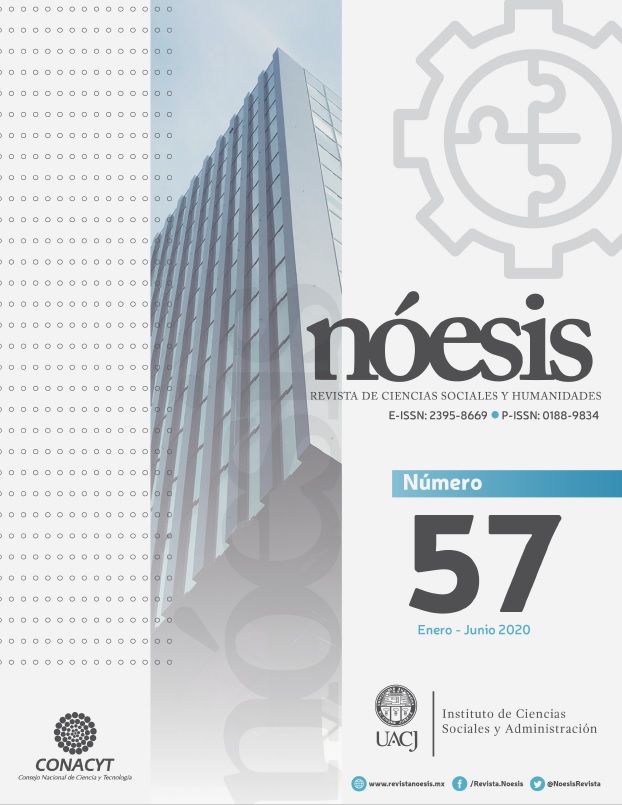Facilitators and obstacles for the evening family commensality
Main Article Content
Abstract
Within the literature, a conflict between an individualistic tendency and materialized cultural values on traditional beliefs about commensality’s value is identified. The present study is based on the use of transversal quantitative methods to approach the influential facilitation and obstruction factors in family commensality occurrence, materialized at the family-shared evening meal, which emerges as the battle flag to maintain this instance. Main results reveal the prominence of those factors related to the individual’s routine in relation to facilitate or obstruct evening commensality performance, in detriment of the related variables to motivations. These findings highlight the relevance to deeply analyze those factors to understand the composition of households or social class as commensality’s main determinants, and the content of their relationship.
Downloads
Article Details

This work is licensed under a Creative Commons Attribution-NonCommercial-ShareAlike 4.0 International License.
References
Anzorena, Claudia. 2009. El¿ retorno? del Tratado sobre la Familia de Gary Becker-Algunas reflexiones en torno a los criterios de eficiencia que legitiman los planes compensatorios de fines de la década de 1990. Kairos: Revista de temas sociales, 24 (1): 1-15.
Beck, Ulrich. 2003. La individualización: el individualismo institucionalizado y sus consecuencias sociales y políticas. Barcelona: Paidós.
Blake, Christine, Carole Bisogni, Jeffery Sobal, Margaret Jastran, Carol Devine. 2008. How adults construct evening meals. Scripts for food choice. Appetite, 51 (3): 654-662.
Brannen, Julia, Rebecca O’Connell y Ann Mooney. 2013. Families, meals and synchronicity: eating together in British dual earner families. Community, Work & Family, 16 (4): 417-434.
Cheng, Shu Li, Wendy Olsen, Dale Southerton, Alan Warde. 2007. The changing practice of eating: evidence from UK time diaries, 1975 and 2000. The British Journal of Sociology, 58 (1): 39-61.
Cho, Eunae y Tammy Allen. 2013. Work-to-family conflict and the family dinner: what makes a difference? . Community, Work & Family, 16 (1): 88-99.
Danesi, Giada. 2012. Pleasures and stress of eating alone and eating together among French and German young adults. Menu: the Journal of Eating and Hospitality Research, 1 (1): 77-91.
Devine, Carol, Margaret Connors, Jeffery Sobal, Carole Bisogni. 2003. Sandwiching it in: spillover of work onto food choices and family roles in low-and moderate-income urban households. Social science & medicine, 56 (3): 617-630.
Douglas, Mary. 1972. Deciphering a Meal. Daedalus 101(1): 61–81.
Elias, Norbert. 1991. La société des individus. Paris: Fayard.
Fischler, Claude. 1995. El (H)omnivoro. El gusto, la cocina y el cuerpo. Barcelona: Editorial Anagrama.
Fjellström, Christina. 2008. Mealtime and meal patterns from a cultural perspective. Food & Nutrition Research 48(4): 161–164.
Giacoman, Claudia. 2016. The dimensions and role of commensality: A theoretical model drawn from the significance of communal eating among adults in Santiago, Chile. Appetite, 107 (1): 460-470.
Giacoman, Claudia. 2018. Eating time in Santiago, Chile: A trade-off between norms and biological and social requirements. Time & Society: 0961463X18783361. DOI: 10.1177/0961463X18783361.
Giacoman, Claudia y Denisse Devilat. 2019. La estructura y las características socio-demográficas de los eventos alimentarios en Santiago de Chile Revista chilena de nutrición, 46 (2): 1-8.
Grignon, Claude. 2012. Comensalidad y morfología social: un ensayo de tipologías. Apuntes de investigación del CECYP, 22 (1): 11-18.
Jackson, Peter y Jackie Pickering. 2009. Changing Families, Changing Food Final Report. (5 de enero, 2019)
Jastran, Margaret, Carole Bisogni, Jeffery Sobal, Christine Blake, Carol Devine. 2009. Eating routines. Embedded, value based, modifiable, and reflective. Appetite, 52 (1): 127-136.
Jiménez, Andrés y Emilio Moyano. 2008. Factores laborales de equilibrio entre trabajo y familia: medios para mejorar la calidad de vida. Universum (talca), 1 (23): 116-133.
Kremmer, Debbie, Annaliesa Anderson y David Marshall. 1998. Living together and eating together: changes in food choice and eating habits during the transition from single to married/cohabiting. . The Sociological Review, 46 (1): 48-72.
Mäkelä, Johanna, Unni Kjaernes, Pipping Ekström, Elisabeth Lorange, Jukka Gronow, Lotte Holm. 1999.
Nordic Meals: Methodological Notes on a Comparative Survey. Appetite, 32 (1): 73-79.
Marín, Manuel, Eduardo Infante y Marcos Rivero. 2002. Presiones internas del ámbito laboral y/o familiar como antecedentes del conflicto trabajo-familia. Revista de Psicología Social, 17 (1): 103-112.
Marshall, David y Annie Anderson. 2002. Proper meals in transition: young married couples on the nature of eating together. Appetite, 39 (3): 193-206.
Martínez, María y Amparo Osca. 1983. Estudio psicométrico de la versión española de la escala de «conflicto familia-trabajo» de Kopelman, Greenhaus y Connoly. Revista de Psicología Social, 16 (1): 43-57.
Maury, Eduardo. 2010. Ritos de comensalidad y espacialidad. Un análisis antropo-semiótico de la alimentación. Gazeta de antropología, 26 (2): 1-13.
Mestdag, Inge y Ignace Glorieux. 2009. Change and stability in commensality patterns: a comparative analysis of Belgian time-use data from 1966, 1999 and 2004. The Sociological Review 57(4): 703–726.
Riquelme, Olivia y Claudia Giacoman. 2018. La comida en familia: La idealización de un evento social. Revista chilena de nutrición, 45 (1): 65-70.
Rivera, Valentina. 2017. Comidas familiares en santiago de chile: familia, roles de género y clases sociales. Tesis de maestría, Santiago de Chile: Pontificia Universidad Católica de Chile.
Sobal, Jeffery. 2000. Sociability and meals: facilitation, commensality, and interaction. En Dimensions of the meal: The science, culture, business, and art of eating, editado por Herbert Meiselman. Gaithersburg, Maryland: Aspen publishers, 119-133.
Sobal, - y Mary Nelson. 2003. Commensal eating patterns: a community study. Appetite, 41 (2): 181-190. Warde, Alan y Kevin Hetherington. 1994. English households and routine food practices: a research note. The Sociological Review, 42 (4): 758-778.
Zabludovsky Kuper, Gina. 2013 El concepto de individualización en la sociología clásica y contemporánea. Política y cultura (39): 229–248.

